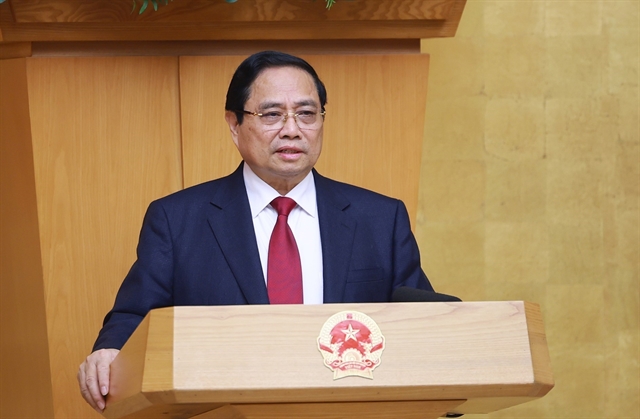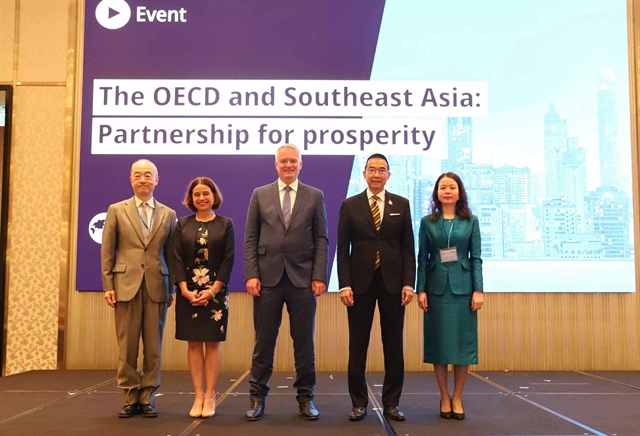 Politics & Law
Politics & Law


|
| Deputy Minister Nguyễn Minh Hằng attended the OECD Southeast Asia Regional Forum 2025 in her capacity as Co-Chair of the Southeast Asia Programme for the 2022–25 term. Photo courtesy of the Ministry of Foreign Affairs. |
BANGKOK – Vietnamese Deputy Minister of Foreign Affairs Nguyễn Minh Hằng called for a deeper partnership between the Organisation for Economic Cooperation and Development (OECD) and Southeast Asia during the 2025 OECD Southeast Asia Regional Forum in Bangkok, Thailand on May 2.
Speaking as Co-Chair of the OECD’s Southeast Asia Regional Programme (SEARP) for 2022–2025, Hằng stressed the need for collaboration amid global uncertainties, with SEARP playing a key role in supporting economic reform, regional integration, and inclusive and sustainable development.
She outlined three proposals for future cooperation: bolstering support for regional countries’ economic reform and new growth engines like digital transformation, green transition, innovation, and science and technology; elevating Southeast Asia’s role in shaping a global governance system that is fair, transparent, efficient, and future-ready; and fostering mutual engagement to bring Southeast Asia closer to the OECD and vice versa, in order to reinforce mutual trust and understanding.
Delegates engaged in vibrant discussions on ways to deepen the bilateral partnership, with a key focus on amplifying the region’s voice in OECD policy-making and agenda-setting.
Within the framework of the forum, Hằng held bilateral meetings with OECD Secretary-General Mathias Cormann, Australia’s First Assistant Secretary of Foreign Affairs and Trade Robyn Mudie, and Ambassador Jun Shimmi, Japan’s Permanent Representative to the OECD.
The foreign officials hailed Việt Nam’s socio-economic achievements and development strategy and congratulated the country on excellently fulfilling its role as Co-Chair of the SEARP during a period when global and regional economies faced numerous challenges. Việt Nam successfully advanced the programme’s three priorities: supporting Southeast Asian countries in post-COVID-19 economic recovery, promoting policy and legal reforms, and bringing regional countries closer to the OECD.
Hằng expressed gratitude for the valuable support and partnership from the OECD Secretariat, Australia, Japan, and other OECD member countries. She affirmed Việt Nam’s commitment to making further contributions to the programme and the partnership between the OECD and Southeast Asia, as well as further elevating Việt Nam – OECD relations.
On this occasion, she requested the OECD Secretariat and other member countries to continue supporting Việt Nam in its new strategic development phase, particularly in improving institutions, policy and investment climate to attract high-quality investment, promoting innovation and science-technology, and developing the private economic sector.
Earlier, consultations on the OECD Economic Surveys: Việt Nam 2025 were held at the OECD headquarters in Paris from April 29 to May 1, during which Hằng shared Việt Nam’s development directions and priorities for the coming period. She stressed that the survey should outline an appropriate roadmap aligned with Việt Nam’s development conditions and fully reflect its strategic directions.
OECD member countries appreciated Việt Nam’s socio-economic development achievements, its development potential, and investment attraction prospects, while offering substantive recommendations closely aligned with Việt Nam’s development realities amidst profound global economic transformation.
The economic survey is periodically developed by the OECD for member countries and important partners. The 2025 edition aims to provide a comprehensive assessment of all aspects of Việt Nam’s economy and offer specific recommendations on promoting macroeconomic foundations for growth, inclusive development, unlocking low-carbon economic growth, and leveraging trade and investment flows to boost productivity. The report is highly regarded by many countries and considered a valuable reference for guiding and developing socio-economic policies. — VNS